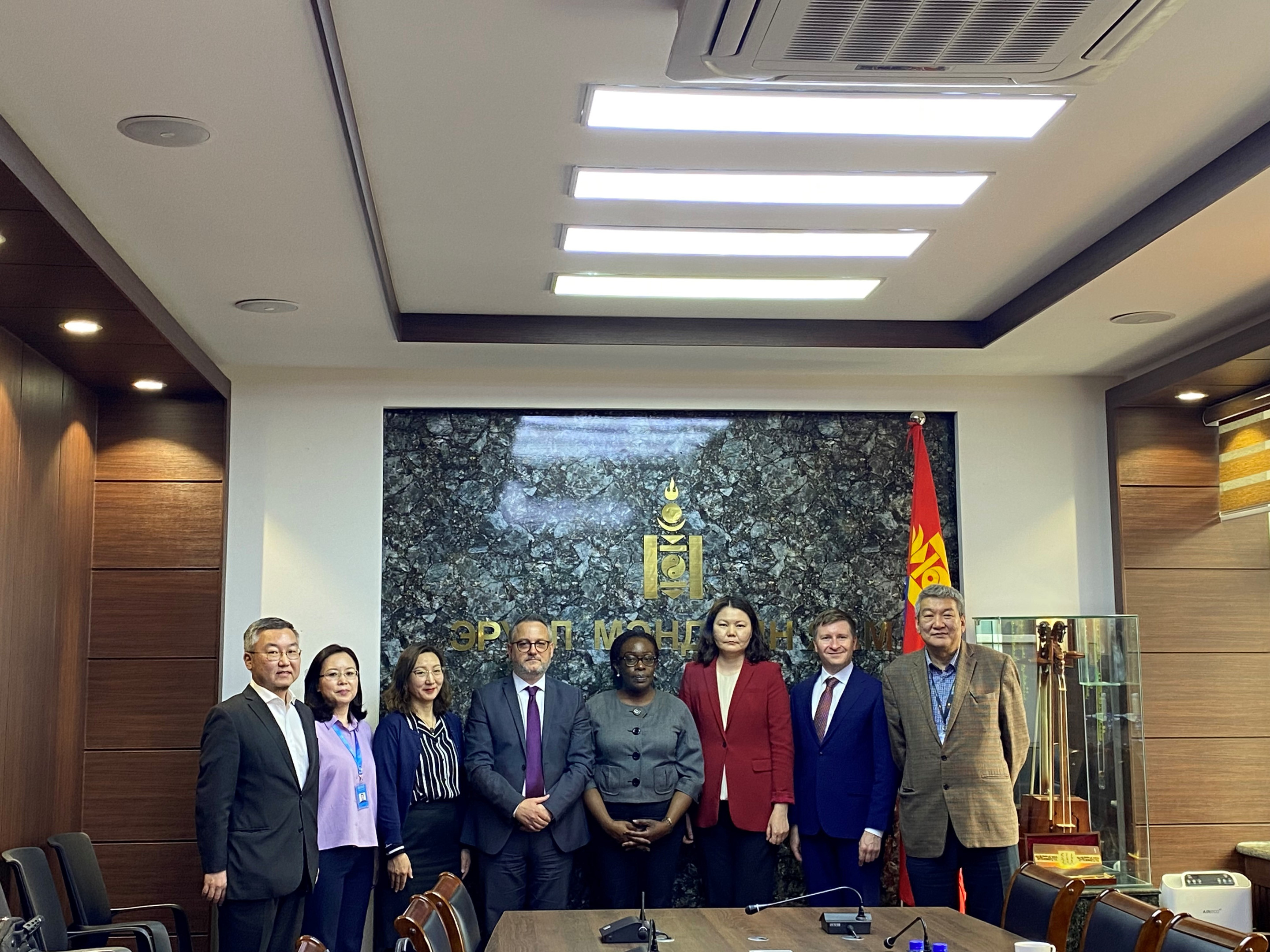
During the May 2024 imPACT Review mission to Mongolia, experts visited national and regional hospitals and different health care facilities to gain a thorough understanding of Mongolia's cancer control capacity and needs. (Photo: I. Veljkovik / IAEA)
Mongolia is steadily expanding the capacity of its workforce to detect and treat cancer earlier, according to a team of international experts appointed by the IAEA, the World Health Organization (WHO) and the International Agency for Research on Cancer (IARC). The team conducted a comprehensive assessment of the country's cancer control capacities and needs during an imPACT Review mission in May 2024. Findings from this review are expected to inform a new National Cancer Control Plan (NCCP) that is currently under development in the country.
Ochirbat Dagvadorj, then State Secretary of the Ministry of Health of Mongolia, underlined the significance of the joint assessment: "Making quality cancer services and care freely accessible is a priority for our Government," he said. "The financial burden associated with cancer care has an enormous impact on government spending," he added. "That is why we need to focus more on the prevention and early detection of cancer, so that the quality of life of patients is improved and at the same time, health spending on cancer care is lessened from a health system perspective."
In 2022, the WHO-IARC Global Cancer Observatory reported an estimated 6699 new cancer cases in the country. In the same year, close to 5000 people are estimated to have died from the disease. For both men and women, the most common type of cancer is liver cancer. Awareness raising, screening and early detection are key to prevent mortality rates from rising even further.
"The imPACT assessment is a concrete step for the government of Mongolia to progress cancer control in the country, complementing the many efforts that are already undertaken on the ground," said Socorro Escalante, WHO Representative to Mongolia. "The evidence-based assessment of health system capacities will shape the future of cancer control where it matters most: skilled and competent human resources, early access to quality diagnosis and treatment, optimization of scientific innovation and advanced technologies and improvement of the overall quality of life for individuals and families dealing with cancer," she added.

The mission to Mongolia kicked off by meeting then State Secretary for Health Ochirbat Dagvadorj and other senior officials from the Ministry of Health. (Photo: I. Veljkovik / IAEA)
The Government of Mongolia is committed to expanding its skilled workforce thanks to international partnerships. In September 2023, Mongolia signed a triangular cooperation agreement with the Korea Institute of Radiological and Medical Sciences (KIRAMS) and the IAEA to strengthen Mongolia's nuclear medicine and radiation oncology capacity. Under the agreement, existing radiation medicine facilities will be reinforced and expanded, and medical assistance for radiation emergencies in Mongolia will be established. The agreement also defines ambitious areas on which to collaborate through the Rays of Hope initiative - the IAEA's flagship initiative to expand access to cancer care for all. Radiation medicine experts from KIRAMS joined the imPACT Review mission to Mongolia - a tangible result of the trilateral agreement.
KIRAMS President Jin Kyung LEE announced: "Since partnering with the IAEA in 2011, KIRAMS has been dedicated to advancing radiation medicine, including nuclear medicine and radiation oncology, in developing countries. We are particularly pleased to have successfully transferred nuclear medicine technology to Mongolia, significantly enhancing their cancer treatment capabilities. With the recent three-party cooperation agreement, we aim to continue our impactful projects. We seek ongoing support from the IAEA and related organizations to ensure these initiatives flourish and deliver meaningful outcomes in radiation medicine for Mongolia."
Mongolia is also a member of the Global Medicine Platform, an initiative by St. Jude Children's Research Hospital to provide free medicines for children with cancer, and the WHO's Cervical Cancer Elimination Initiative, an initiative which helps governments fight cervical cancer by providing tools for earlier screening, awareness raising and vaccination policies.

The imPACT Review team also seized the opportunity to meet different UN agencies and development partners active on the ground to explore synergies for collaboration in support of Mongolia's advancing national cancer control programme. (Photo: I. Veljkovik / IAEA)
The IAEA's Programme Management Officer for Mongolia, Denis Subbotnitskiy, acknowledged the progress already made to improve cancer control in Mongolia and was confident that the additional data collected during the imPACT Review would help deliver more change for patients with cancer. "It was an honour to witness firsthand the many steps taken already to improve cancer control in Mongolia," said Subbotnitskiy. "Armed with this additional information, under IAEA's Rays of Hope initiative, we look forward to tailoring our projects even more to expand access to early cancer diagnosis and care for the citizens of Mongolia. This review will help shape the implementation of projects supported through the IAEA technical cooperation programme, ensuring they deliver maximum impact. By aligning our efforts to the specific needs identified, we aim to strengthen local capacities, enhance radiation therapy services, and ultimately help deliver tangible, life-saving changes for patients battling cancer across the country," he added.






